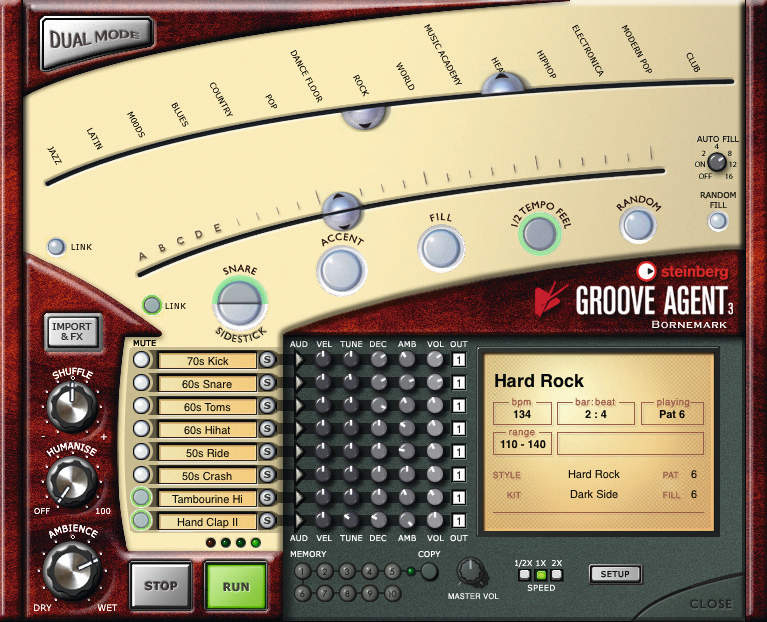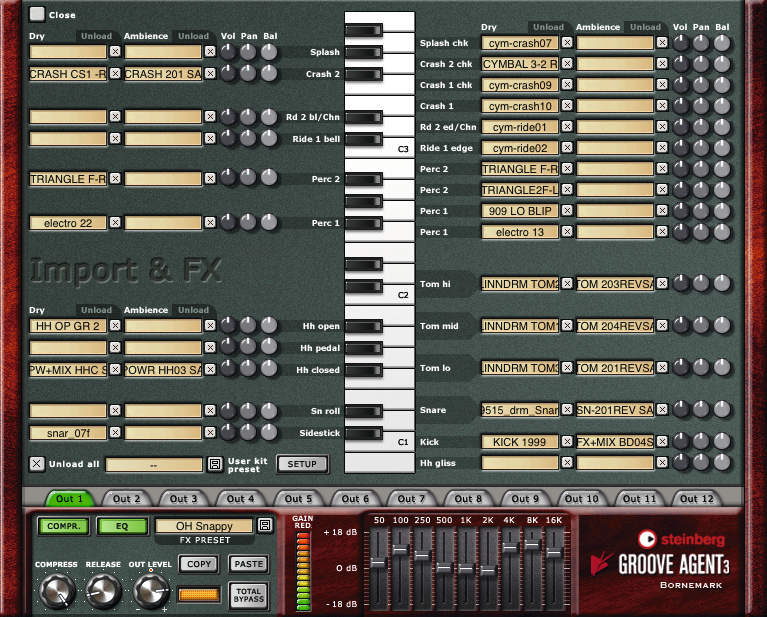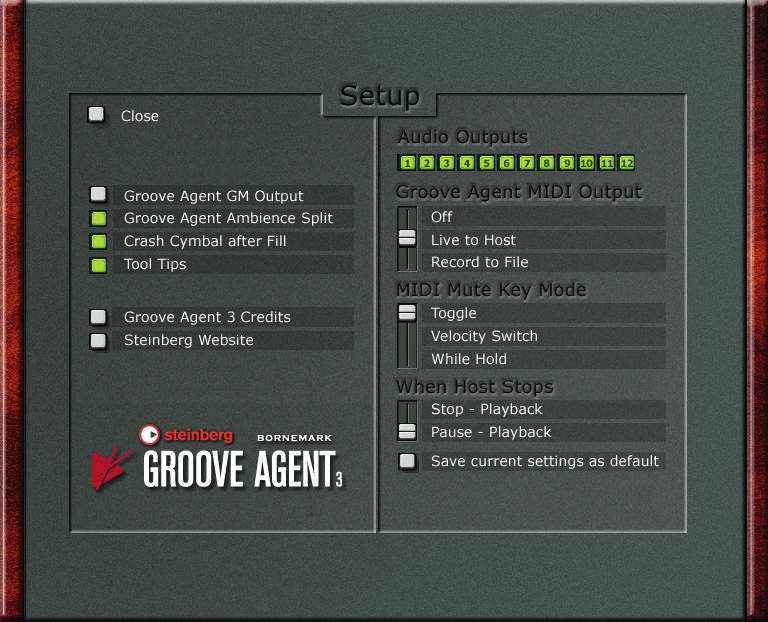MusicRadar Verdict
Groove Agent offers great drums and percussion on tap and, thanks to the two new Agents, sounds better than ever. Cubase and Nuendo users will get the best from it, however.
Pros
- +
Instant, usable beats. Broad range of styles and sounds on offer. You can use two Agents simultaneously.
Cons
- -
Patchy MIDI implementation. Works best in a VST host. Special Agent module lacks basic mixing options.
MusicRadar's got your back



Now at version 3, Steinberg's virtual drummer has carved out its own niche in a field dominated by large sample library players. Its ethos is to be easy to use and immediately accessible while still producing great results, even for those who know next to nothing about drumming or drum programming.
GA3 supports the VST, DXi, AU and ReWire standards and also works as a standalone app. It basically uses the same system as previous versions, which is built around styles and kits. This means a certain pattern will automatically load a particular kit (although they can be unlinked if you want), and the idea is that you play (or 'run') the pattern in real time and in sync with your host, adding fills and accents as you wish.
There are various ways to modify this behaviour, such as the useful 1/2 Tempo Feel function, and a number of random options can be applied to both fills and patterns. As you may have gathered, though, GA3 basically supplies beats for you rather than expecting you to program them yourself. This is fundamental to the instrument's design and, coupled with the large Complexity slider, makes it easy to produce great performances.
With 20 different complexities from which to choose, you build dynamics by adjusting this slider during a track (ie, via automation), and there are also Humanise and Shuffle controls to further enhance the 'as played' feel. In addition, both the Style and Complexity sliders can be unlinked, enabling you to select unrelated kits and patterns or vary the complexity of your fills.
All in all, there are plenty of options, and when combined with additional kits (including some tasty drum machines), a couple of new player modules, better effects implementation and the option to import your own samples, Groove Agent 3 is clearly a more complex beast than its predecessor.
Additions
GA3 adds its new modules by incorporating a new Dual mode. In essence, this means that although you can run it just like the previous versions in Classic mode (which uses preset patterns and multilayered samples to create its beats), to access the extra modules, you'll need to switch to Dual mode, where you can get at the two new 'Agents': Special and Percussion.
Dual mode features a split upper/lower window design with the potential to run any two modules at once. All the same features are there - they're just a little more compact, and you now get to take your pick of the three modules: Groove Agent, Special Agent and Percussion Agent.
The two new additions are pretty different to the original module, which is no bad thing. Special Agent adds 15 new styles, all performed on a real kit by Swedish session drummer Rasmus Kihlberg. These vary from jazz to funk to rock, and each includes 25 complexity levels, 25 fills and 25 half-tempo renditions.
Percussion Agent is a slightly different consideration, but sees Mr Kihlberg on the case again, this time playing 18 percussion instruments, ranging from cowbells to tambourines, each with five levels of complexity. To be honest, the five complexity options are just different patterns, but with a variety of pieces used in each category you get some great variations.
Despite being recorded from live performances, both of these new Agents sync to different tempos, as the samples have been sliced up ReCycle!-style.
Realism
The new modules in GA3 seriously change the overall impression of the plug-in, moving it away from instant beat creation into the more realistic realms of FXpansion's famous BFD or XLN Audio's Addictive Drums. Switching between the original Groove Agent module and the new Special Agent one is particularly enlightening, as the latter simply sounds more realistic. The use of three kits in the recording sessions also means there's plenty of sound variation.
However, the routing is limited to kit and ambience, and there are no internal level controls for Special Agent in the way that there are for the other two modules. This hinders your balancing options and - aside from the ability to tweak the Ambience level - you essentially get what you're given.
On a more positive note, the new percussion module really rounds things off, giving you instant access to tempo-matched percussion in the same way that Spectrasonics Stylus does.
Groove Agent 3 is a much better equipped plug-in than its predecessor, but it should be noted that, because of the way it uses the MIDI and automation output facilities of the VST protocol, it's best suited to people whose DAW supports this plug-in standard (Audio Units hosts don't support MIDI output from instruments).
MusicRadar is the number 1 website for music makers of all kinds, be they guitarists, drummers, keyboard players, djs or producers...
GEAR: We help musicians find the best gear with top-ranking gear round-ups and high- quality, authoritative reviews by a wide team of highly experienced experts.
TIPS: We also provide tuition, from bite-sized tips to advanced work-outs and guidance from recognised musicians and stars.
STARS: We talk to musicians and stars about their creative processes, and the nuts and bolts of their gear and technique. We give fans an insight into the actual craft of music making that no other music website can.
“Built from the same sacred stash of NOS silicon transistors and germanium diodes, giving it the soul – and snarl – of the original”: An octave-fuzz cult classic returns as Jam Pedals resurrects the Octaurus
What’s the buzz? Meet Yellowjacket, Cherry Audio's recreation of EDP’s trend-setting Wasp from 1978
“A fabulous trip through all eight songs by 24 wonderful artists and remixers... way beyond anything I could have hoped for”: Robert Smith announces new Cure remix album










